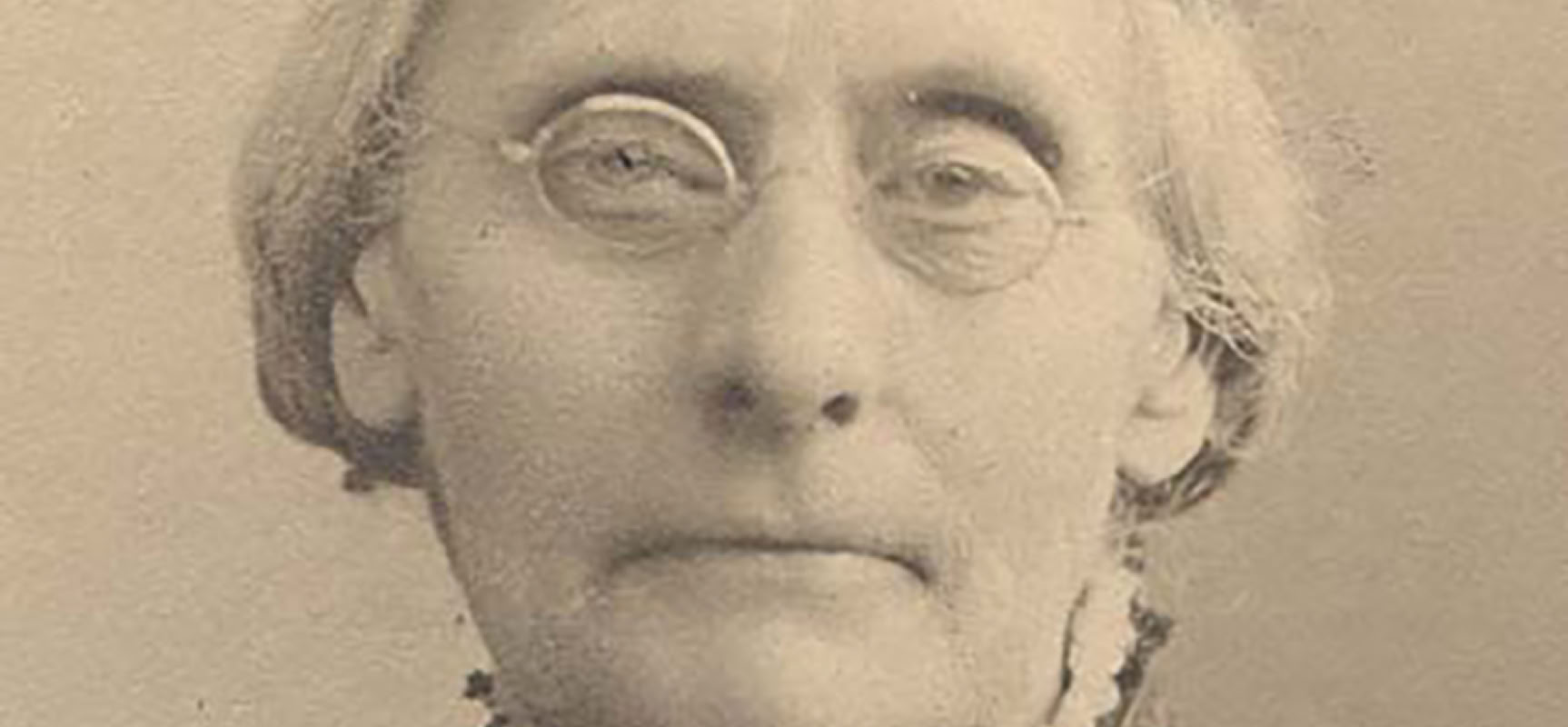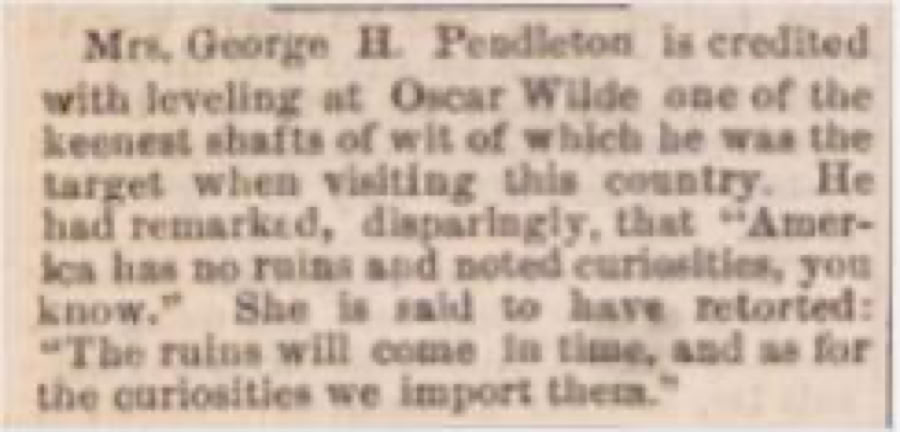
[Various quotations]
WHERE IT FIRST APPEARED IN PRINT BY WILDE
In the short story:
The Canterville Ghost, 1887. viz:
"I don't think I should like America."
"I suppose because we have no ruins and no curiosities," said Virginia satirically.
"No ruins! no curiosities!" answered the Ghost; "you have your navy and your manners."
The Court and Society Review in two parts Vol. IV, No. 138, February 23, 1887, pp. 183--186. [Mason, 12]. Vol. IV, No. 139, March 2, 1887, pp. 207--211 [Mason, 13]
WHERE IT REAPPEARED
In the play:
A Woman of No Importance, 1894. Act 2. viz:
LADY CAROLINE: There are a great many things you haven't got in America, I am told, Miss Worsley. They say you have no ruins, and no curiosities.
MRS. ALLONBY: [To LADY STUTFIELD.] What nonsense! They have their mothers and their manners.
Magazine: Mason, 12, 13
Play: Mason 364
Bibliography of Oscar Wilde
by Stuart Mason, 1914
LONDON | T. WERNER LAURIE LTD.


COMMENTARY
During Wilde's visit to America in 1882 several stories became attached to him—some based in truth. Others were apocryphal: one such was an observation about ruins and curiosities that first appeared in conversation and then made its way into the press, e.g.:
Ann Arbor Courier
The ruins and curiosities in question, in literal terms, were those historically interesting structures and artifacts found in old castles or cathedrals, that the European visitor might find conspicuous by their absence in America. What had Wilde said about this, if anything?
On February 8, 1882 a newspaper interviewer [1], attempting to separate some of the fact from the fiction, put this to him:
It is said that you complained that there were no quaint ruins in this country, no curiosities, and a lady replied, "Time will remedy the one, and as for the curiosities, we import them."
Wilde acknowledged that the story had been following him "all over the country", but conceded that the observation was not his. He replied:
Yes, that is an excellent story. It was first told of Charles Dickens when he visited the country.
The press, however, knowing that Wilde made good copy continued to associate the remark with him and proceeded to introduce various forms of irony into the theme:
For one newspaper, however, having Wilde only loosely associated with the remark in a playful way was not enough, and later that month the quotation continued its evolution in a more personal way when this appeared:
.
Whether Wilde actually took the time while traveling to telegraph to a remote and, to him, obscure newspaper is doubtful. It was certainly not his style to insult his hosts publicly, indeed he had already been at pains while in America to correct and distance himself from rumors in that regard.
However, Wilde had recently been introduced to those stalwart Victorians Tilden and Anthony and an intriguing possibility arises when one delves a little deeper into the Tilden/Anthony allusion.
On the day before the report of the telegraphed message in the The Morning Oregonian a similar allusion had appeared in an even more obscure publication. This was The Bohemian, a new journal produced by A. H. Isler in Columbus, OH, as follows:
The papers say that the æsthetic apostle, Oscar Wilde, is in deep despair because so far in his tour through America, he has discovered no ruins. The man is evidently blind, or how could he travel across this country without tumbling against a ruin of some sort, sooner or later? There are our political ruins--how far can a live, wide-awake man travel without coming in contact with one of them? If he goes East there is Roscoe Conkling, Sam Tilden, General Grant,...for what can be more æsthetic in the way of ruins than Walt Whitman, Wendell Philips, Susan B. Anthony, Theodore Tilton, George Francis Train, Mary Walker, Henry Ward Beecher and many others I might name. Certainly, a man must be pretty blind if he cannot find plenty of ruins in this country.
[The Bohemian, Columbus, OH. March 25, 1882]
This article, mentioning ruins, Tilden, and Anthony, appearing the very day the telegraph was sent in Oscar Wilde's name to The Morning Oregonian, raises the possibility that it could have given someone the idea for the message. If so, whoever sent it must have been in a position to have read this new issue of a short-lived, regional publication in Columbus, OH. Could that have been Wilde, perhaps on a long train journey?
Therein lies the intrigue. We know from his tour itinerary that in February/March 1882 Wilde was indeed traveling in the midwest, and by the time of the telegraph to the Oregon newspaper, he had arrived on the west coast.
The congruence, however, could be coincidental. Besides, we do not know (currently) that the telegraph actually came from Wilde as purported, nor that a telegraph was sent at all.
Whatever the intricacies of the remark in Wilde's time in America, we can be certain of one thing: that the observation became a favorite of his and he adapted it on two subsequent occasions in his works.
Perhaps no quotation ever truly has one author and we can take solace in the Wildean thought that originality is the last refuge of the unappreciative.
© John Cooper
Related Blog Article:

Oswego Morning Express, March 4, 1882
Oswego Morning Express, March 7, 1882

Transcription
Oscar Wilde telegraphs to say that he takes back what he said about there being no ruins in this country. He has been introduced to Sammy Tilden and Susan B. Anthony.
The Morning Oregonian (Portland, OR) | Sunday, March 26, 1882, 6